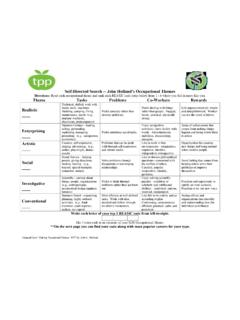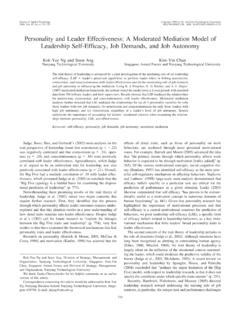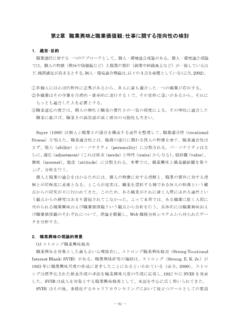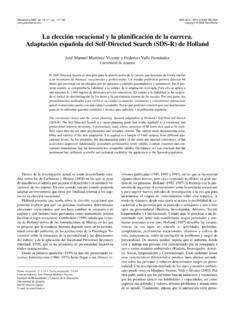Transcription of WHAT DOES IT MEAN TO TAKE OWNERSHIP OF YOUR …
1 WHAT DOES IT MEAN TO take OWNERSHIP OF YOUR CAREER - 7 Key Responsibilities The challenge for each of us today is to recognize that the only real security we possess is that which we create within ourselves. It s clear in today s work environment that our success depends on our ability to take OWNERSHIP of our own careers and manage our development opportunities. This message isn t new. We ve been reading about it over the last several years, and companies have been telling us that our careers are our responsibility, unlike the days of future passed where both our managers and employers took on much of that role.
2 Our own work experiences support this new thinking when we see how companies are responding to all of the global workforce business drivers - increased competition, stakeholder pressures, changing worldwide markets and customer expectations. Organizations are reinventing themselves. They are lean and flat; contract labor, restructuring and outsourcing are on the norm; accelerating technology and organization changes are rampant; work roles are being redefined and manager spans of control are much greater.
3 The result?..you and I must take the lead in charting our own future; no one else can do it for us. The question is how? What are the 7 responsibilities for managing our career development today? 1. Develop self and career management skills Taking initiative is critical to career success because jobs and requirements will change rapidly. Our workplace is more competitive. After all, we are all a resource or a product in today s market with tremendous skills and experiences to sell. We need to know ourselves, what we have to offer, our skills, talents and attributes; and be able to sell ourselves in our own way with our own personality.
4 Career management is using this new self-reliant attitude in planning and directing our experiences to achieve our work, life, and education/training goals, our Career Development. (Refer to this Career Development definition and our discussion in Career Development Today, How Would You Describe It? - Parts 1 and 2.) , that sounds good, now where do we start? Developing self and career management skills begin 2. Becoming self-aware, create career focus, passion and meaning in your work. Now that s pretty heavy, but I m convinced it is our right and challenge.
5 Each and every one of us can and should aspire to this, amidst the claims from others and ourselves of don t be foolish, this is just pie in the sky, I ve got a family to feed, and can t worry about loving or even liking what I do. Yet, I work with employees every day that have created or are committed to finding meaningful work opportunities, and who enjoy, even love, their work. Though they are in the minority, they are proof that you and I can make it happen.
6 Career management starts with looking inside ourselves, taking inventory, and answering some tough questions like: What are your career goals? Where do you see yourself in one year? five years? 10 years? Are your goals and plans written, including dates? How does your present position fit into your plan? Describe your passion. What turns you on? challenges you? Can you find it in your present work? If not, how can you build it into your work? Or is it a hobby, volunteer activity or outside interest?
7 If so, can you make it a career? What are your 4-6 most important skills or strengths? I ask this of employees all the time and find very few who can respond positively unless they have been through some self-assessment process. The flip side is what are those weak areas or skills that you need to further develop or strengthen? Even more importantly, what are your motivated skills, those skills that you not only excel at but that you enjoy using most? Career success can simply be stuffing as many motivated skills into your present role and future plans, then sitting back and watching positive changes happen.
8 Like the talented engineer who identified her motivated skills as working under pressure, participating in tiger teams, solving the most difficult of challenges. Yet, she was in a position where she was unable to use any of these, was very dissatisfied and ready to leave the company. Shortly after completing a series of self-assessment skills, interests, values and goal-setting exercises, she negotiated new responsibilities with her boss, found herself back on track and eventually in a leadership role, which was a goal on her career plan.
9 Of course, her career flourished. What a win-win for both the employee and the organization. How do your interests, values, mission or purpose, goals and skills match up with your present role, career path or present direction? What about with your department and employer business goals and direction? This is the most complex question in this career puzzle, but one you need to be able to answer. By aligning your knowledge of yourself and your career direction with your knowledge of the organization, you create energy and excitement in your work.
10 You can begin this self-awareness process by enrolling in the Personal Career Leadership and Five Principles of Career Success workshop series that we offer in our career consulting and coaching practice ( ). Like an old friend, What Color is Your Parachute by Richard Nelson Bolles has long been another great starting place. John Holland s Interest Inventory (Self Directed Search), Edgar Schien s Career Anchors Values Inventory, Campbell Interest and Skill Survey (CISS), DISC, MBTI and TalentSmart Emotional Intelligence inventories are solid assessment instruments that are available.






